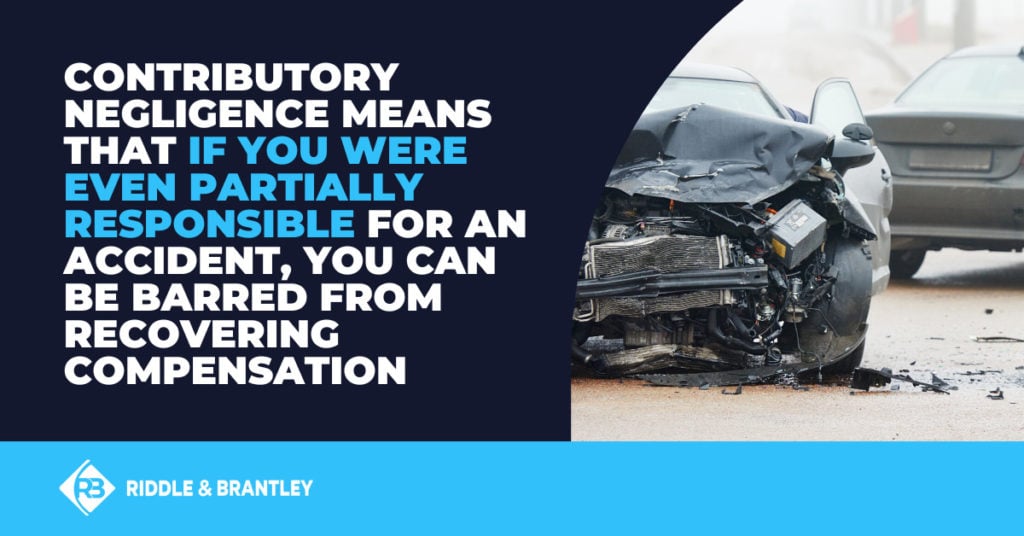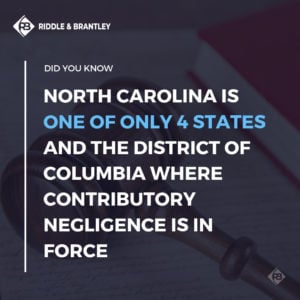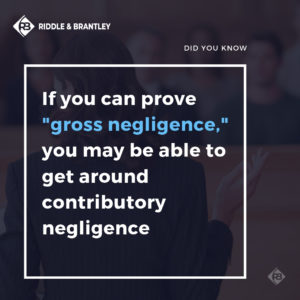Contributory Negligence Defense in Car Accident Cases in North Carolina
 If you live in North Carolina, you may have heard of "contributory negligence." Contributory negligence is a law governing personal injury claims that is currently in force in 4 states, including North Carolina, and the District of Columbia. Contributory negligence bars a person from recovering compensation in a personal injury claim or lawsuit if he or she is even partially at fault, thus contributing to their own injury. The contributory negligence defense makes seeking compensation for accident victims much more challenging in North Carolina, and underscores why it's important to talk with an experienced car accident attorney if you've been hurt due to another's negligence.
At Riddle & Brantley, we often remind our clients that if you're even 1% responsible for the accident, you may be barred from any recovery in your injury claim. However, just because defense counsel or the insurance company uses the contributory negligence defense does not necessarily mean that your claim will be barred. Our experienced North Carolina car accident attorneys have decades of experience holding insurance companies accountable and we've defeated the contributory negligence defense many times.
If you live in North Carolina, you may have heard of "contributory negligence." Contributory negligence is a law governing personal injury claims that is currently in force in 4 states, including North Carolina, and the District of Columbia. Contributory negligence bars a person from recovering compensation in a personal injury claim or lawsuit if he or she is even partially at fault, thus contributing to their own injury. The contributory negligence defense makes seeking compensation for accident victims much more challenging in North Carolina, and underscores why it's important to talk with an experienced car accident attorney if you've been hurt due to another's negligence.
At Riddle & Brantley, we often remind our clients that if you're even 1% responsible for the accident, you may be barred from any recovery in your injury claim. However, just because defense counsel or the insurance company uses the contributory negligence defense does not necessarily mean that your claim will be barred. Our experienced North Carolina car accident attorneys have decades of experience holding insurance companies accountable and we've defeated the contributory negligence defense many times.
Contributory Negligence is Not Absolute
It's also important to note that in North Carolina, the contributory negligence defense is not absolute. In fact, the North Carolina Court of Appeals ruled in 2022 that the defendant must prove there is more than "a scintilla of evidence" that the plaintiff contributed to the accident. In its opinion, the Court ruled that a plaintiff is “not required to anticipate that the defendant [will] be negligent.” While a plaintiff has a duty to take due care on the road, “he is entitled to assume, even to the last moment, that [another] driver will … comply with the law.” The Court also reaffirmed that the defense must prove there is more than “a scintilla of evidence” that the plaintiff was negligent, meaning that the contributory negligence defense is not absolute."If the insurance company tries to use the contributory negligence defense to deny your claim, your case isn't over. We would love to help however we can."-Gene Riddle, attorney, Riddle & Brantley
[su_button background="#13182E" color="#ffffff" size="10" wide="yes" center="yes" url="tel:1-800-525-7111" desc="Facing a contributory negligence defense in your injury case?"]Click to call and speak with an attorney who can help![/su_button]
Real-Life Example
For example, suppose a plaintiff is injured in an auto accident caused by another driver (the defendant) who ran a stop sign, but the plaintiff was speeding more than 15 miles per hour over the speed limit. The insurance company handling the claim may determine that the excessive speed also contributed to the accident and deny the claim based on the contributory negligence defense. Therefore, the injured party may not be entitled to recover any damages from the other party who supposedly caused the accident. Contributory negligence occurs when there has been some act or omission on the victim’s part which has contributed to the cause of the accident. In other words, it is a sharing of responsibility for damages when a person suffers partly by his or her own fault as well as the fault of the other party. Contributory negligence can only be applied to a case where both parties, the plaintiff and the defendant, are guilty of negligence and the negligence causes injury or harm."How Can Contributory Negligence Affect My Injury Claim?"
In effect, contributory negligence means that even if the other party is 99% responsible for the accident, if you’re just 1% responsible, you may not be entitled to compensation. North Carolina is one of only four states that practice contributory negligence in personal injury law. The District of Columbia also has a contributory negligence law. Unlike these five jurisdictions, all other states look at the percentage of fault involved for each party and calculate the damages accordingly. This model is called "comparative negligence."
For example, in a state that does not apply contributory negligence, a plaintiff’s damages may be apportioned depending upon the comparative negligence laws in that state which vary according to each state.
If your accident occurred in another state, we can help you determine how to proceed, and we can help find an attorney in that state to help us prosecute your case. However, in states like North Carolina where contributory negligence is in force, the reality is much harsher. A plaintiff found to be at fault in any way would be completely barred from any recovery. It is therefore extremely important that you consult with an injury lawyer with experience countering contributory negligence defenses in North Carolina.
For a FREE, no-obligation consultation with a car accident attorney who can help defeat a contributory negligence defense in your injury case, call 1-800-525-7111. At Riddle & Brantley, our attorneys have over 225 years of combined legal experience and we have won many cases where insurance companies tried in vain to deny our clients' claims with a contributory negligence defense.
North Carolina is one of only four states that practice contributory negligence in personal injury law. The District of Columbia also has a contributory negligence law. Unlike these five jurisdictions, all other states look at the percentage of fault involved for each party and calculate the damages accordingly. This model is called "comparative negligence."
For example, in a state that does not apply contributory negligence, a plaintiff’s damages may be apportioned depending upon the comparative negligence laws in that state which vary according to each state.
If your accident occurred in another state, we can help you determine how to proceed, and we can help find an attorney in that state to help us prosecute your case. However, in states like North Carolina where contributory negligence is in force, the reality is much harsher. A plaintiff found to be at fault in any way would be completely barred from any recovery. It is therefore extremely important that you consult with an injury lawyer with experience countering contributory negligence defenses in North Carolina.
For a FREE, no-obligation consultation with a car accident attorney who can help defeat a contributory negligence defense in your injury case, call 1-800-525-7111. At Riddle & Brantley, our attorneys have over 225 years of combined legal experience and we have won many cases where insurance companies tried in vain to deny our clients' claims with a contributory negligence defense.
[su_button background="#13182E" color="#ffffff" size="10" wide="yes" center="yes" url="tel:1-800-525-7111" desc="Don't get pushed around by the insurance company."]Click to call for a free consultation![/su_button]
"Is There Any Way Around the Contributory Negligence Defense?"
Yes. The contributory negligence rule in North Carolina is almost legally bulletproof, but there are rare exceptions. At Riddle & Brantley, our North Carolina car accident attorneys have extensive experience helping our clients win cases that the insurance company originally rejected based on the contributory negligence defense. Our efforts are also supported by legal precedent in North Carolina, in which the courts have ruled that the contributory negligence defense is not absolute.Exceptions to Contributory Negligence in North Carolina
The contributory negligence defense may be overcome in two primary ways: 1) when the injured party is able to prove “gross negligence”; or 2) when the injured party is able to prove “last clear chance” on the part of the defendant.Gross Negligence
"Gross negligence" is a legal concept in North Carolina personal injury law that can sometimes defeat a defense of contributory negligence. Gross negligence is the conscious and deliberate disregard of the need to use reasonable care, which is likely to cause injury or harm to a person, property, or both. It is extreme conduct when compared to ordinary negligence, which is a failure to exercise simple, reasonable care. Gross negligence occurs when a defendant shows reckless disregard for the safety of a plaintiff. For example, if the other driver is Driving While Impaired (DWI) then that act is most probably grossly negligent conduct which would prevent that defendant driver from using contributory negligence as a defense.
If the defendant's actions can be proven to represent "gross negligence," then contributory negligence will not apply.
Gross negligence occurs when a defendant shows reckless disregard for the safety of a plaintiff. For example, if the other driver is Driving While Impaired (DWI) then that act is most probably grossly negligent conduct which would prevent that defendant driver from using contributory negligence as a defense.
If the defendant's actions can be proven to represent "gross negligence," then contributory negligence will not apply.